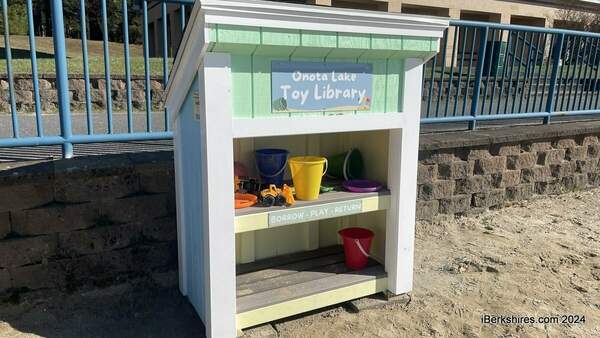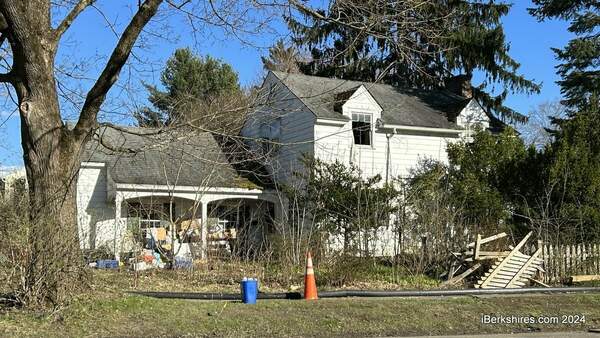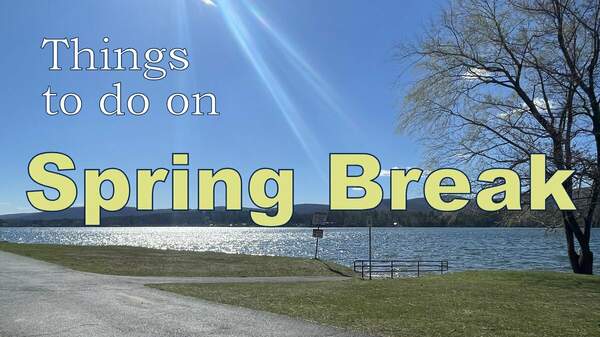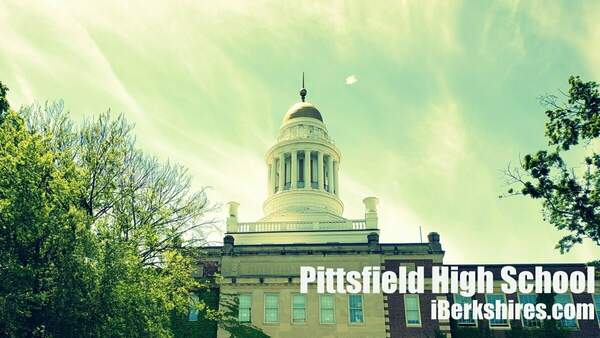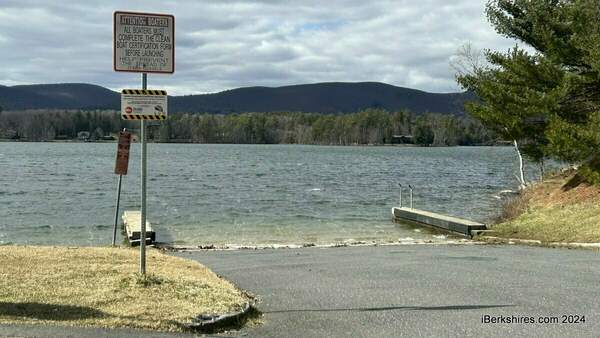Legislative Q&A: State Rep. Paul Mark
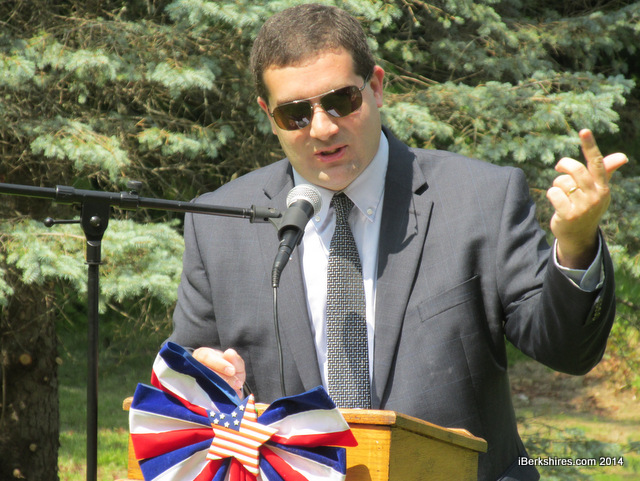 State Rep. Paul Mark, seen at the Fitch-Hoose House celebration in Dalton earlier this summer, said the higher education budget was a highlight for this session. State Rep. Paul Mark, seen at the Fitch-Hoose House celebration in Dalton earlier this summer, said the higher education budget was a highlight for this session. |
DALTON, Mass. — In this last legislative session, state Rep. Paul Mark was appointed his first chairmanship — one to lead a subcommittee in investigating student debt.
The joint subcommittee launched the investigation which took them to colleges across the state and ultimately filing a report outline the leading factors to growing debt. That, Mark says, help in advocating for the budget and next session he hopes to file a large piece of legislation based on those recommendations.
Meanwhile, from bond bills to election regulation, Mark says the Legislature was able to accomplish a lot in the last two years. iBerkshires recently sat down with Mark to talk about what has been done and what is to come.
Q: What were the highlights of this session?
PM: One of the highlights for me was the higher education budget. So, in last year's budget we got a complete tuition and fee freeze at all public colleges and universities throughout the state. In the current budget, we did really well. We got the freeze at 100 percent at UMass and at some of the community colleges. The state universities came up a little bit short but they are in a much better position that they were even just a couple of years ago. I would like to think the work we did in the student debt subcommittee had a lot to do with that. It provided some good ammunition of why this would be beneficial and what are the consequences of not taking any action.
Also with the budget, for the area I represent regional school transportation came in at 90 percent. I think this is the first time it has ever been that high. When this happened about 15 years ago, the promise was 100 percent. It has never been 100 percent. For me, this was a big win in the current budget. It is a good win going forward because it sets a new benchmark. Next year, if the proposal is 80 percent, I get to say that's a 10 percent cut and we can't accept that. We can fight for 90 percent or higher — that's what we build on from now on.
Q: Besides regional school transportation, what other aspects were you fighting for and how did they fare?
PM: Chapter 70, which is regular school money, is at the highest level in history. It is obviously an increase over last year — kind of modest — but it shows the commitment we have to ensure the students have the resources they need to succeed. I think it is paying off because we are consistently No. 1 in the nation in our school systems.
For me, something I personally filed, an amendment to create in Franklin County an opioid task force was accepted and to create an anti-crime task force, which was modeled after the one that exists in Berkshire County. They've been dealing with some of the same opioid issues that we've been dealing with over here for a while — and I am sure they always had the same problem but they are starting to come to terms with it. They formed a task force with their district attorney, with the register of probate and the sheriff. It was a really good program and I was glad to get that money in the budget for them.
There was broader substance abuse language in the budget that tries to get more resources to mental health and treatment.
Q: How are the state's finances looking overall?
PM: The finances in the state are in a really good position. We have a AA-plus bond rating. That is the highest in the history of the state and when the United States itself was downgraded, we were upgraded to AA-plus. They were downgraded to AA-plus from AAA.
I think that is a result of how we managed the rainy day fund, while we continued to have bond bills we kept them at a reasonable level to reduce debt. With the improved bond rating, that means our interest rates are lower. That is saving people money.
When we talk about the rainy day fund, we have the fourth strongest rainy day fund in the nation. We are the only one with more than $1 billion that isn't dependent on oil. That's a big deal.
Q: Bill-wise, which particular pieces of legislation did you either file or were a supporter of that passed?
PM: I'll start with some of the bond bills to keep with the financial part. We passed an environmental bond bill. I was a member of the environmental committee and I was pretty active on that as it worked through the process. It was $2.2 billion. There was $1 million for the turf field at BCC in Pittsfield. I was able to get $1 million for a brownsfield redevelopment in Greenfield; $2.5 million for a sewer system in the town of Colrain, which has gone through some tough times. And there was $255 million for DCR, which right over the line in Hawley, they've been having trouble with the Dubuque State Forest and trying to get loans to connect both ends of the towns. I'm hoping this extra money will help with that.
We have a IT bond bill — information technology bond bill — and that contains $50 million to finish the job for last-mile broadband. That's going to be money for the unserved communities like Peru, where I live, but also some of the underserved communities like Northfield, Shelbourne, that are 70 percent served but 30 percent without any high speed service. We want to make sure no one is left behind. Hinsdale would be in that same category.
I'm excited to see now as the MBI, Wire West and any other groups that get involved, how they are going to tackle it and how soon they get started. I'm the only legislator in the state with no high-speed Internet, no cable TV, no cell phone service at my house.
We have the capital bond bill. It was $1.25 billion and I was able to get $2.5 million for the sheriff (Thomas Bowler) to do a pre-released center on campus instead of having to do it on Second Street in Pittsfield. Also in the capital bond bill, we re-authorized $250,000 for accessibility improvements at the Dalton town hall.
The transportation bond bill has the money for rail service from New York City to Pittsfield and it contains money for rail service in the Pioneer Valley, which is expected to begin on Dec. 29. Then there will be a supplement of $30 million the delegation over there put in to establish commuter rail service between Greenfield, Northampton, Holyoke and Springfield.
Q: What about the pure legislation?
PM: We passed a super PAC disclosure bill, which is really a big deal to me. It is going to require these independent expenditure committees and super PACS to report what they are doing and where the money is coming from. Then if they put a commercial on TV, they have to list their top five contributors publicly. They have to report four times a year. I have to report three times a year and now these shadowy groups are going to have to start reporting four times a year.
Since the Citizens United [U.S. Supreme Court] decision came down a few years ago, we are already starting to see the effects. This is going to be the first statewide race year — with the governor and all the other candidates on the ballot — this will be the first time we see how Citizens United will affect that. We are already starting to see it. A lot of my colleagues are starting to complain about these anonymous mailings that are going around about them. A couple of candidates for governor were fighting over whether they should take a people's pledge or not. Unfortunately, we are powerless as it stands to stop Citizens United. But at the least, we can make sure people know where the money is coming from and where it is going. Hopefully, they can use the information to make the best decision. You'll know if a mailing shows up on the door and it has a fancy name like Massachusetts Citizens for Truth, you can look up to see 'oh, this is actually Coca-Cola' or whoever it may end up being.
On that same theme, we passed an election laws bill. When the elections every two years — not the primaries just the general elections — there will be early voting for 11 days prior to election day. You will be able to go to city hall or town hall and vote early if you can't get there on the actual election day itself. As a concession, because I represent so many small towns where they are not open for all of those 11 business days, they are only required to offer the early voting when they are open for business anyway If Peru is only open on Mondays, then that's it. You just have to have a spot where people can vote.
You don't have to be there seven days a week. And there will also be an online voter registration system set up in the near future. You can register your car and renew your license online so where you have online service, it is going to be a good thing. The more people able to vote, the better.
Q: Which committees were you on and what were you able to accomplish?
PM: I was the vice chair of the higher education committee and a lot of our focus was budget related. When you talk about helping public higher education, a lot of it has to do with money.
As part of my duties on the higher education committee, I was appointed to be the chair of a subcommittee on student loans and debt. We have seven hearings across the state, one here in Berkshire County, with good turnout at all of them, lots of good testimony and lots of good ideas. We came up with a series of recommendations and a lot of the budget items have become implemented. But there is still a lot of work to do.
When we get back into formal session in January, I am already in the process of working with the committee to draft a bill to officially put into place the recommendations we made. I plan on filing that — or co-filing it — when we get back in January. The bad news is, most of it is still money.
Q: What provisions are going to be included in it?
PM: In addition to setting minimum levels of funding for the operations of the universities, we are trying to put more money in for the Mass Grant program for scholarships, no interest loans, to development more public-private partnerships — like what we did in Franklin County for advanced manufacturing training at the Franklin County Technical School — and more programs like the one I personally benefit from like the Verizon Next Step, where they sent me to college one day a week to learn more about telecommunications and get a degree in applied sciences.
To make colleges more affordable, we're going to improve financial literacy programs. One of the biggest things that came out of these hearings is that people are unprepared to plan and to implement a plan for financing their college education. We want to do more work at funding savings plans and creating an incentive to save like a tax match at the state income tax level or a match for lower income students. When you save money in something like the U-Plan maybe the state can match some dollars last year.
Q: What other committees were you on?
PM: I was on environment, agriculture and natural resources. One of the biggest things we did was the environmental bond bill. We passed favorably
the GMO labeling bill with strong support on the committee and strong support in the Legislature. But, unfortunately, it did not pass the entire Legislature by Aug. 1, the end of formal session. While it is still alive, in informal sessions any one legislator can object and that will kill the bill. I think at least one person will object, so I don't think it will happen this year.
We also passed a bill to ban fracking in Massachusetts. Fracking is already technically illegal but there are some loopholes people are afraid they might get around. So, this will make it illegal to frack in Massachusetts. There is some potential for some shale reserves in the Pioneer Valley. It will also make it illegal for us to accept the waste water from other states from fracking.
The third committee I am on is the tourism, arts and culture. They had two chairs, a new House chair and a new Senate chair, and they really undertook a robust agenda. They had hearings in every single tourism council in the state. We had a
big hearing at the Berkshire Museum in Pittsfield. We had another one in Franklin County. We had one in Hampshire County. We had one at the Basketball Hall of Fall. We were able to go an listen to local artists and owners of cultural attractions. We heard where the funding they receive helps them. And we were also able to showcase for Legislators, what the best aspects of each region are.
When I go to the State House and talk about how beautiful it is here in the Berkshires, it really helps if I've had 30 people out here to see for themselves.
Q: You mentioned the GMO bill wasn't passed. What other bills didn't pass?
PM: One of my signature bills that I filed two sessions and didn't get through — but it did pass through the labor and workforce development committee twice — is my employee stock ownership cooperative development bill.
There are two parts to it. There is language that makes it easier for workers to establish a co-operative or stock-ownership if the business is on the verge of failing. And then, even more important is in the budget, is trying to get the Massachusetts Office of Employment Involvement and Ownership funded again. It has been zero funded since the economic crisis began in 2008. I've filed amendments for $150,000, $250,000, just to get a couple people in there working.
These people are experts in the field to help businesses that are looking to change their model into an employee-owned business and able to help the employees get the management skills and financial skills that they need to make this thing a reality. If a business is thinking about closing down or maybe it has been a family business and they don't want to stay in business and are thinking of selling out, I think it would be so much better if the workers knew they had the right to buy it and the skills and expertise to keep it local, to keep the business thriving. If the employees own the business they are more invested in making sure it succeeded and that's a recipe for success. Ocean Spray is a worker co-operative. Cape Air is a worker co-operative. You have examples right here in the state. I was disappointed that didn't happen, again.
Single-payer health care is a thing that is important to me. When we talk about budgets and budgets being tight, one of the biggest drivers of increasing costs in our budget is health care. I am a co-sponsor of a bill to move to a single-payer model. But, I am also a co-sponsor of a bill to perform a study that will show every year the difference the state paid in health care costs versus what we would have paid if we had a single-payer system. If we did that for three or four years and it turns out we would have saved $500 million, that's pretty significant.
Two years ago, we did pass a health care reform bill that is expected to save hundreds of millions of dollars over the next 10 years. But, I think you can map that our even further. Depending on who the next governor is, it might be a nice opportunity to at least make the study happen.
Tags: Berkshire delegation, Q&A, representative, state officials,
 State Rep. Paul Mark, seen at the Fitch-Hoose House celebration in Dalton earlier this summer, said the higher education budget was a highlight for this session.
State Rep. Paul Mark, seen at the Fitch-Hoose House celebration in Dalton earlier this summer, said the higher education budget was a highlight for this session.
